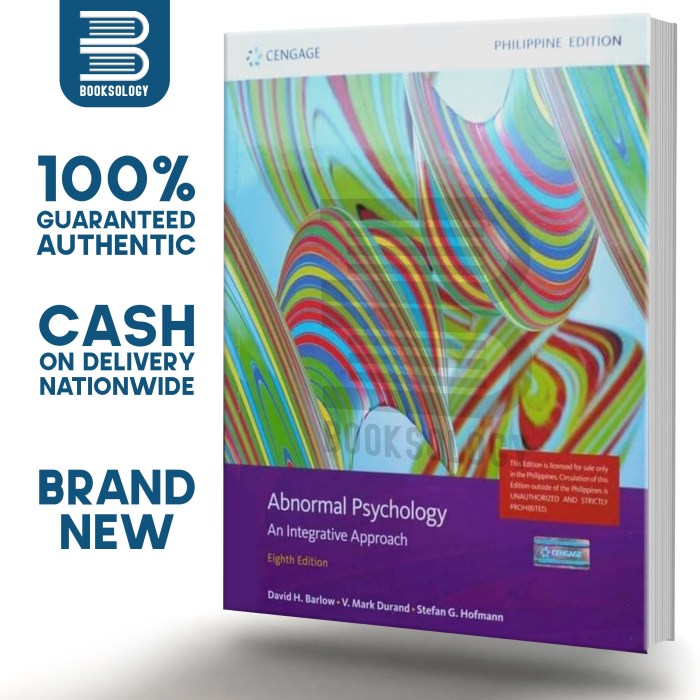Essentials of abnormal psychology 8th edition pdf – Welcome to the 8th edition of Essentials of Abnormal Psychology PDF, the definitive guide to understanding mental health. This comprehensive resource delves into the major theoretical perspectives, assessment and diagnosis, and treatment options for a wide range of mental disorders.
With its engaging writing style and evidence-based content, this book provides an invaluable foundation for students, practitioners, and anyone seeking a deeper understanding of abnormal psychology.
From anxiety disorders to schizophrenia spectrum disorders, this book covers the full spectrum of mental health conditions. It explores the latest research findings, diagnostic criteria, and treatment approaches, empowering readers with the knowledge and tools they need to make informed decisions about their mental health and well-being.
Introduction
Abnormal psychology is the scientific study of psychological disorders, also known as mental illness. It investigates the causes, symptoms, diagnosis, and treatment of these conditions, aiming to understand and alleviate mental distress and suffering.
The 8th edition of “Essentials of Abnormal Psychology” provides a comprehensive overview of the field, incorporating the latest research and advancements in understanding mental disorders. It offers an evidence-based approach, emphasizing the importance of scientific inquiry and critical thinking in understanding abnormal psychology.
Major Theoretical Perspectives
There are several major theoretical perspectives in abnormal psychology, each offering a unique lens through which to understand mental disorders:
Psychodynamic Perspective
The psychodynamic perspective emphasizes the influence of unconscious conflicts and childhood experiences on the development of mental disorders. It focuses on uncovering these unconscious processes through techniques such as free association and dream analysis.
Behavioral Perspective, Essentials of abnormal psychology 8th edition pdf
The behavioral perspective views mental disorders as learned behaviors that can be modified through conditioning and reinforcement techniques. It focuses on observable behaviors and environmental factors, emphasizing the role of learning in shaping psychological problems.
Cognitive Perspective
The cognitive perspective emphasizes the role of thoughts and beliefs in the development and maintenance of mental disorders. It focuses on identifying and changing maladaptive thought patterns and cognitive distortions that contribute to psychological distress.
Humanistic Perspective
The humanistic perspective focuses on the individual’s subjective experience, personal growth, and potential for self-actualization. It emphasizes the importance of free will, choice, and personal responsibility in understanding and treating mental disorders.
Assessment and Diagnosis
Assessing and diagnosing mental disorders involves a multi-faceted approach that includes:
Clinical Interviews
Clinical interviews are in-depth conversations between a mental health professional and the individual seeking help. They involve gathering information about the individual’s symptoms, history, and current functioning.
Psychological Tests
Psychological tests are standardized tools used to measure various aspects of an individual’s psychological functioning, including personality traits, cognitive abilities, and emotional states.
Observational Techniques
Observational techniques involve observing an individual’s behavior in different settings to assess their interactions, communication patterns, and overall functioning.
The Diagnostic and Statistical Manual of Mental Disorders (DSM-5) is the primary diagnostic tool used by mental health professionals to classify and diagnose mental disorders. It provides specific criteria for each disorder, ensuring consistency in diagnosis across different settings.
Anxiety Disorders
Anxiety disorders are characterized by excessive and persistent fear, worry, and nervousness. They include:
- Generalized Anxiety Disorder (GAD)
- Panic Disorder
- Phobias
These disorders can significantly impair an individual’s daily functioning, causing distress and interfering with work, relationships, and overall well-being.
Treatment options for anxiety disorders include psychotherapy (e.g., cognitive-behavioral therapy), medication (e.g., antidepressants), and self-help strategies (e.g., relaxation techniques).
Mood Disorders

Mood disorders involve disturbances in mood, ranging from intense sadness and hopelessness to excessive elation and euphoria. They include:
- Depression
- Bipolar Disorder
- Seasonal Affective Disorder (SAD)
Mood disorders can have severe consequences, impacting an individual’s ability to work, study, and maintain relationships.
Treatment options for mood disorders include psychotherapy (e.g., interpersonal therapy), medication (e.g., antidepressants or mood stabilizers), and lifestyle interventions (e.g., exercise and sleep hygiene).
Answers to Common Questions: Essentials Of Abnormal Psychology 8th Edition Pdf
What is the purpose of the 8th edition of Essentials of Abnormal Psychology?
The 8th edition of Essentials of Abnormal Psychology provides an updated and comprehensive overview of the field, incorporating the latest research findings and diagnostic criteria. It aims to provide students, practitioners, and individuals with a deeper understanding of mental health conditions and their treatment options.
What are the major theoretical perspectives covered in the book?
The book covers the major theoretical perspectives in abnormal psychology, including psychodynamic, behavioral, cognitive, and humanistic approaches. It discusses the strengths, limitations, and applications of each perspective, providing a well-rounded understanding of the field.
What types of mental disorders are discussed in the book?
The book covers a wide range of mental disorders, including anxiety disorders, mood disorders, schizophrenia spectrum disorders, personality disorders, substance-related and addictive disorders, and eating disorders. It provides detailed descriptions of each disorder, including their symptoms, causes, and treatment options.
